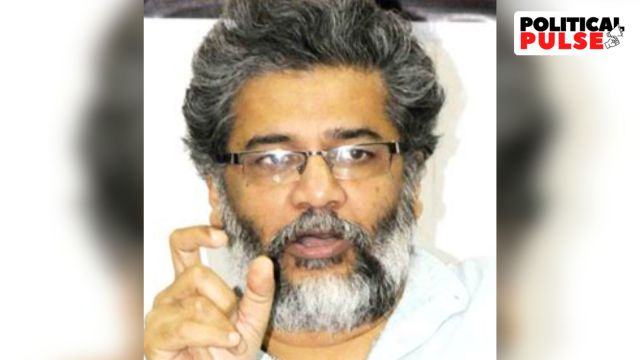‘INDIA bloc was totally missing in Delhi… not just in terms of AAP, Congress fighting … but the whole spirit’: CPI (ML) L
Mahagathbandhan leader Dipankar Bhattacharya explains why Bihar’s INDIA ties more “organic”, says ‘capital-intensive’ Prashant Kishor wrong fit for "labour-intensive" Bihar.
 CPI(ML) general secretary Dipankar Bhattacharya. (Photo Credit: liberation.org.in)
CPI(ML) general secretary Dipankar Bhattacharya. (Photo Credit: liberation.org.in)Five years ago, the Bihar Assembly elections marked the resurgence of the Left in the key Hindi heartland state. The CPI(ML) Liberation led the way, winning 12 of the 19 seats it contested, with the Left bagging 16 seats overall.
The CPI(ML) Liberation is a constituent of the Rashtriya Janata Dal (RJD)-led Mahagathbandhan in Bihar. In an interview, its general secretary Dipankar Bhattacharya talks about the lessons the Delhi Assembly elections hold for the Opposition in Bihar that goes to polls later this year, where the Aam Aadmi Party (AAP) went wrong, and if RJD leader Tejashwi Prasad Yadav should be named the Mahagathbandhan’s CM candidate.
Excerpts:
* What is your assessment of the Delhi election results?
There are a few factors. This (AAP) government was not allowed to function. The Delhi government’s powers upheld by the Supreme Court were completely taken away by Parliament. The Lieutenant Governor (L-G) was basically becoming a super Chief Minister and kind of a dictator.
But I must also say that the AAP, whatever it promised in its initial days, suffered a major loss of image. In terms of the working people of Delhi, maybe the poorest of Delhi, they got something but the promises made to the working people, the lower middle class, those promises were not kept. So, I think people got disillusioned or disenchanted, even if I don’t call it complete anger.
Anyway, there was always a kind of duality in Delhi. People who used to vote for the BJP in the Lok Sabha used to vote for the AAP in the Assembly. So there is a section of common voters and those voters gravitated towards the BJP. I think it’s a kind of accumulated anti-incumbency and the BJP became the beneficiary. Of course, on top of it, the election was not really free and fair.
* Where does this verdict leave Opposition politics?
It is a bit unfortunate that the election became completely divorced from the context of the relentless assault on the Constitution, on federalism. What happened in Kashmir and what happened in Delhi was unfortunate.
Delhi is always fighting for complete statehood and the Delhi government should have been the first to understand the pain of Kashmir (when Article 370 was abolished and statehood was taken away). But unfortunately, the AAP was the first to support this attack on federalism. That is why probably when Delhi itself was attacked, people did not bother. It all became about the honesty of Kejriwal and his image. He staked everything on himself rather than the attack on democracy, the attack on Constitution, and economic policies.
* After the Lok Sabha setback, the BJP has now won three Assembly polls. Is it a negation of the issues that the Opposition has been flagging?
The one state where it tried its best but failed is Jharkhand. The BJP ran a toxic campaign, they made infiltration the central agenda, and Jharkhand rejected it.
I think the issues flagged properly during the Lok Sabha election, and that also reflected in the outcome, remain extremely pertinent. The resonance has only increased after Amit Shah’s remark about Ambedkar. What Mohan Bhagwat said about the real independence coming after the inauguration of the Ram Temple amounts to a complete negation and trivialisation of the freedom movement and its legacy. It is important for people to understand that the Constitution remains under attack.
Even the Budget. You did something for a small section of the middle class but what about the huge sections of the working people and farmers who pay GST, who don’t get living wages, who do not have any job security or social security?
* What are the lessons for the Opposition in the context of Bihar?
The only lesson we should take is that the INDIA bloc completely disappeared in Delhi. It is not just the AAP and the Congress fought separate elections but in terms of the narrative, the whole spirit was completely absent.
Only eight months ago, we fought together. In Bihar, the alliance predates INDIA. So, I think all that Bihar should do is proper cohesion and projection of a united coalition. There are more organic ties with the movement on the ground. Even in the Lok Sabha election, you could see even the farmers’ movement played a big role, the same Constitution campaign that played a big role. It cannot be just parties contesting independently without any organic connection with the movements below. This is precisely what we are trying in Bihar.
If the AAP government was dislodged just after 10 years, in Bihar you have a government that has been in power for 20 years. So, 20 years of betrayal and accumulated failure. Nitish Kumar is just a tired face of a failed regime where the BJP is calling the shots. In Delhi, the BJP was the beneficiary of anti-incumbency. Here, the BJP in power must be held accountable. Bihar is ready, it will be more like Jharkhand, not like Delhi or Maharashtra.
*In the Lok Sabha polls, the BJP suffered reverses in many states. But the scale of the setback in Bihar was not big.
That is partly because of confusion. For some time, Nitish Kumar was part of INDIA, then crossed over at the 11th hour. That created some confusion. And then the RJD had some problems with Pappu Yadav and all that. Otherwise, maybe Bihar would have been 50:50 like UP. But it became 30:10. Even those 10 seats were a big improvement over the 2019 results.
*Should there be a clear projection of Tejashwi Yadav as the CM candidate?
In a coalition, the leader of the biggest party has the first chance. But I must say that it is not going to be, it is a lesson from Delhi. You made it into a Modi versus Kejriwal battle. It became all about Kejriwal. The AAP, to an extent, survived. It retained some 43% vote share and 22 seats but its prominent leaders, including Kejriwal, lost.
So, the Bihar election is not going to be about who is going to be the next CM. It must be about dislodging the government that has betrayed Bihar, about articulating an alternative agenda.
* What about seat sharing? In 2020, the Congress got 70 seats but its strike rate was poor compared to the RJD and the CPI(ML).
Exactly. I think we should definitely review and learn our lessons from 2020, from the 2024 elections, and have realistic seat-sharing that corresponds to the ground reality.
Right now, it is important to articulate the agenda, set the tone, bring the agenda of transformation and change to the forefront, and reassure all the fighting forces who are fighting on the ground that their concerns will be uppermost on the INDIA bloc’s priority list during the campaign.
* Will Prashant Kishor be a factor?
I don’t see him as a major factor. He is next probably to the BJP in terms of resources. It is a capital-intensive project to create something new. But Bihar is labour-intensive and people-intensive, so we need people-centric, labour-intensive politics.



- 01
- 02
- 03
- 04
- 05




























